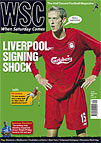 Is a British Olympic football team really feasible? Neil Forsyth isn't convinced
Is a British Olympic football team really feasible? Neil Forsyth isn't convinced
“GB Bid needs Olympic team” screamed the BBC website headline, followed by an urgent appeal for the formation of a British football team for the 2012 London Olympic Games. The date? August, 2003. “Can you imagine”, suggested a bamboozled Craig Reedie, British Olympic Association (BOA) chairman, “running an Olympic Games in Britain without a British football team?”
The answer then, and now, is yes. The Scottish, Welsh and Northern Irish FAs have long been opposed to the creation of a GB XI. Britain has not appeared in the Olympic football finals since 1960 and the last qualifying ties played by a unified side were back in 1971 when a team largely comprised of Isthmian League players beat Bulgaria 1-0 at Wembley and lost the return 5-0. The fact that a GB football team was being presented as a fait accompli two years ago shows the determination of the London lobbyists for the game to fall into line with their glittering vision of 2012.
The men and women in cream suits who danced around their tables in Singapore are not a group of Corinthian custodians of the Olympic ideals. They are gleaned from the upper echelons of consultancies, public relations and other lines of business. Brought in to deliver the Games against the background of the Iraq invasion they did an impressive job. Yet that mixture of gusto, arm-twisting and slick salesmanship should have been left in Singapore, its aim spectacularly achieved. Instead it seems to have a key role in the manifestation of the Games itself. In the days after the win, the GB football team story had a whirlwind of “assisted”, coverage. Correctly deducing that the main opposition would emit from the Scottish FA, the whispering campaign began. “London bid sources said that Scotland was the only obstacle to fielding [a] British team,” explained one broadsheet reporter. Bang on cue the FA’s David Davies insisted the matter should be addressed “with urgency”. Sven-Göran Eriksson, who had been in Singapore (presumably Lawrie Sanchez’s invitation was lost in the post), popped up to state that it was “inevitable” that a home team would take part.
From the BOA came the familiar mix of bemusement and foreboding. “It would be incompatible for us to host an Olympics with a football competition and not have a football team of our own,” said chief executive Simon Clegg. “I don’t think Great Britain would accept the situation where we were not represented.” Whether Clegg was envisaging widespread rioting is unclear, yet if this is the stick then where is the carrot? Both the BOA and Lord Coe’s eager marketeers have been slow to present the benefits of the Home Nations’ finest competing in a tournament contested largely by the Under-23 teams of developing nations at a time when domestic leagues are about to begin, and in the same close season as a European Championship. Presumably the aim is for a mix of emerging Under-21 internationals and “faces”, to draw the crowds. Clearly, financial returns, full stadiums and razzmatazz lay behind the organisers’ elevation of football to a key role in Britain’s Games campaign. This would be acceptable if they were not risking such catastrophic consequences.
Much has been made of Sepp Blatter’s stance that GB involvement would not risk FIFA bending to long-standing unrest at the separate nation billing enjoyed by the Home Nations. Blatter’s most recent quote on the subject was: “It is a competition where the team must be called Great Britain, but how they configure it is their problem.” Hardly a ringing endorsement, especially from the slippery FIFA president.
The final, largely overlooked, hurdle is that the host country does not automatically qualify for the Olympic football finals. If a British male side entered then the likeliest manner of qualification would be for a joint team to reach the semi-finals of the European Under-21 Championship. The traditional separate entries in this important stage of youth player development would have to be withdrawn in favour of the merged team: a final grey area for a debate that has a long way to go.
From WSC 223 September 2005. What was happening this month